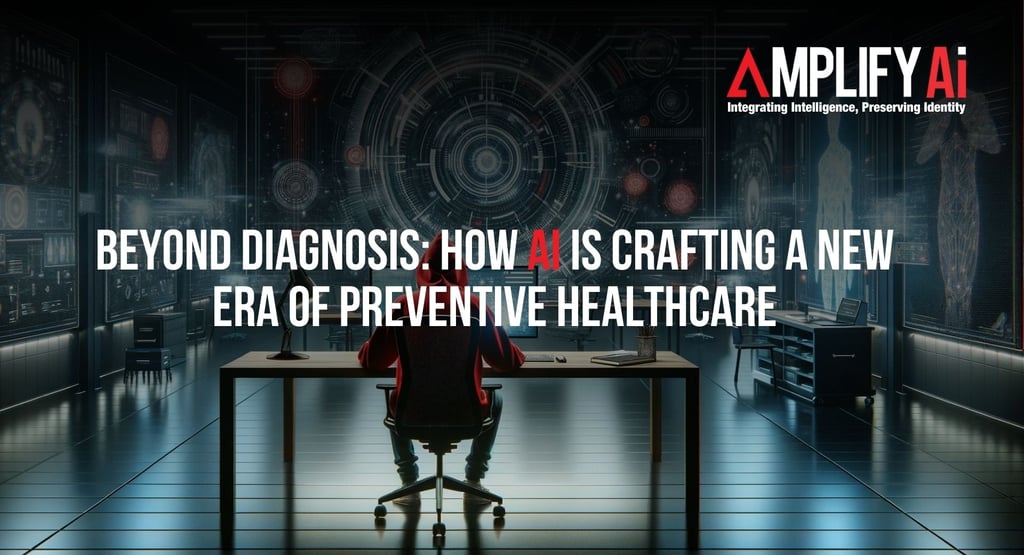Beyond Diagnosis: How AI is Crafting a New Era of Preventive Healthcare
Ronsley Vaz
3 min read


In an era where the relentless pace of technological advancement continues to captivate and astonish, artificial intelligence (AI) has emerged as a leading force, pioneering transformation across a myriad of industries. Among these, the healthcare sector—a domain traditionally marked by its cautious and conservative approach owing to the high stakes of human health—is now increasingly turning to AI, not only to cure but also to prevent. This proactive shift represents a significant paradigm change, moving away from merely reacting to health crises as they occur, to anticipating and mitigating potential health issues before they evolve into more severe concerns.
This transition towards a preventive healthcare model, underpinned by the sophisticated capabilities of AI, heralds a promising future. In this envisioned future, health systems are expected to transform, becoming not just reactive entities that respond to health issues as they arise but proactive systems that anticipate and address health concerns in their nascent stages. The power of AI to sift through and analyze vast quantities of data with unparalleled speed and accuracy enables the identification of patterns and risk factors that may not be immediately apparent to human practitioners. Such capabilities are invaluable in predicting potential health issues, allowing for early intervention strategies that can significantly alter an individual's health trajectory.
Moreover, this shift towards a more predictive model of healthcare is intrinsically linked to the personalization of patient care. AI technologies, through their ability to process and analyze individual patient data, pave the way for healthcare solutions that are tailored to the unique needs and circumstances of each patient. This level of customization ensures that preventive measures and treatments are not only more effective but also more efficient, minimizing unnecessary interventions and focusing resources where they are most needed.
The implications of this evolution are profound. By leveraging AI, the healthcare sector can dramatically improve outcomes for patients, reducing the incidence of severe health issues through timely, personalized, and preventive care. This approach not only has the potential to save lives but also to significantly reduce the burden on healthcare systems worldwide. In a world where healthcare resources are often stretched thin, the ability to prevent health issues before they require complex and costly interventions is a game-changer.
The AI Healthcare Revolution
The integration of AI into healthcare is revolutionising patient care, making it more personalised and efficient. AI algorithms can analyse vast datasets—something human clinicians cannot do at scale—identifying patterns that may elude even the most experienced practitioners. This capability is pivotal in preventive healthcare, where early detection and intervention can mean the difference between a manageable condition and a life-threatening one.
Seneca Advisory, in collaboration with the National Health Service (NHS) in England and the private sector, is pioneering technology solutions, including AI, aimed at making a sustainable, long-term impact on healthcare delivery. Their mission focuses on both educating about and implementing these innovations to improve healthcare services.
The Role of AI in Preventive Healthcare
Preventive healthcare aims to reduce the incidence of illness and disease by focusing on health management and early intervention. AI is at the centre of this shift, providing tools that can predict health risks with remarkable accuracy. For instance, AI-powered systems can now forecast the likelihood of heart attacks or strokes by analysing patterns in historical patient data, lifestyle factors, and genetic predispositions. This predictive capability allows healthcare providers to offer tailored advice and interventions to mitigate these risks before they escalate into more severe problems.
Moreover, AI's role in preventive healthcare extends to monitoring and managing chronic conditions. Wearable technology, equipped with AI algorithms, can track vital signs and detect anomalies indicative of potential health issues. These devices enable continuous monitoring of patients' health status, ensuring timely medical attention when necessary.
Ethical Considerations and Data Privacy
As AI carves its niche within healthcare, ethical considerations and data privacy emerge as significant concerns. The collection, analysis, and storage of sensitive health data necessitate robust safeguards to protect patient privacy. Barker highlighted the importance of ethical AI implementation, stressing that transparency in how patient data is used is crucial for maintaining trust between healthcare providers and patients.
Furthermore, the deployment of AI in healthcare must be inclusive, ensuring that technological advancements benefit all segments of society. This inclusivity involves addressing disparities in access to healthcare technology, ensuring that AI-driven solutions do not widen existing health inequalities.
The Importance of Collaboration
The seamless integration of Artificial Intelligence (AI) into the healthcare ecosystem is a complex, multifaceted endeavor that critically depends on the synergistic collaboration between a diverse array of stakeholders. This includes technology companies who are at the forefront of AI development, healthcare providers who are the end-users of such technologies, policymakers responsible for creating a conducive regulatory environment, and patients, who are the ultimate beneficiaries of these innovations. With extensive experience in the healthcare consultancy domain, it's clear that the indispensable need for a collective effort is crucial to navigate the intricacies inherent in healthcare innovation. It's through such collaborative endeavors that AI solutions can be tailored not only to be at the cutting edge of technology but also to meet the practical necessities and uphold the ethical standards essential for healthcare delivery.
This collaborative framework extends beyond mere consultation. It involves a dynamic, ongoing interaction where feedback loops between technology developers and healthcare professionals ensure that AI tools are refined and adapted to real-world clinical settings. For instance, clinicians can provide insights into the practicality of AI applications in patient care, highlighting areas for improvement. In turn, technologists can iterate on these insights, enhancing AI systems to better meet the needs of healthcare providers and their patients.
Preparing for the Future
As AI continues to evolve, the healthcare sector must remain agile, ready to adapt to new developments and challenges. This preparedness involves investing in education and training for healthcare professionals, enabling them to utilise AI tools effectively. It also means fostering a culture of innovation within healthcare institutions, where continuous learning and improvement are prioritised.
In conclusion, AI is ushering in a new era of preventive healthcare, where technology empowers healthcare providers to anticipate and address health issues before they escalate. This shift towards a more proactive and personalised healthcare model holds the promise of improved health outcomes and enhanced quality of life for individuals around the globe. However, realising this promise requires careful navigation of the ethical implications of AI, a commitment to data privacy, and a collaborative effort among all stakeholders involved in healthcare delivery. As we stand on the brink of this transformative era, the healthcare sector's ability to embrace and adapt to AI will be crucial in shaping the future of health and wellness.
Subscribe to the podcast
Subscribe now to "Amplify Ai" and let's set sail together on this exciting voyage towards business growth and success.



